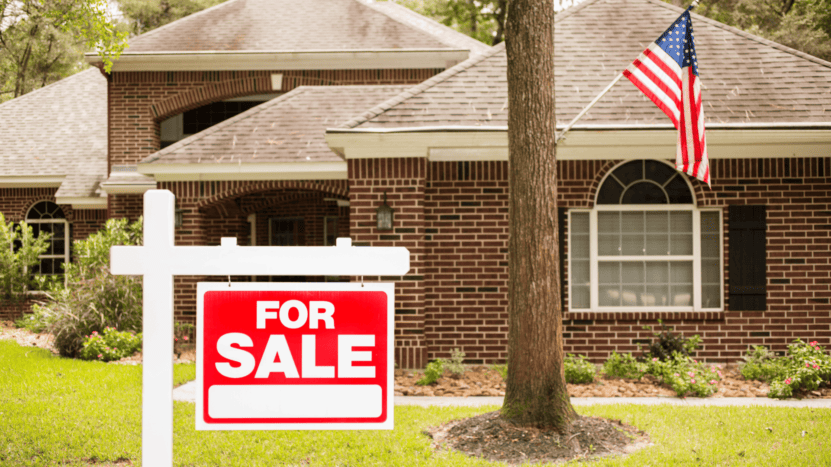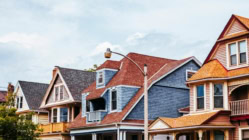RFK Predicts 3 Corporations Will Own 60% Of Housing By 2030!
In this 1-minute video from the National Real Estate Post, RFK says that 3 giant corporations (BlackRock, Vanguard and State Street) will own 60% of America’s single-family homes by 2030, if they continue their buying trajectory.
So, that huge amount of demand would be bullish for housing prices – despite the repercussions. BUT – the housing bears have been claiming for months that these same firms are going to start dumping all of their inventory, and thus crash the market.
So – which is it? Excess demand from all the buying, or excess supply from all the selling?
This is just a reminder that nobody actually has a clue what will happen over the long term – or even in 2024. I am, however, going to briefly set out the bullish and bearish arguments – and explain why I remain bullish.
Bullish Housing
Here are some of the reasons housing bulls like Barry Habib remain very confident that housing will continue to appreciate.
Predicted Appreciation.
Barry Habib likes to remind us over and over that everyone predicted a housing slide this year, but we will instead see 5% to 10% appreciation (depending on the source) despite extremely high interest rates. Habib’s team further cites a survey of prominent economists that predicts a full 18% level of appreciation over the next five years.
Housing Shortages.
This is probably the biggest reason why Habib remains such a bull. Prior to 2008, there were far more new homes constructed than there were new households formed (when kids move out, graduate from college, get married, etc.). Since 2008, however, the reverse has taken place, as there have been far more new households created than new homes coming online. As I explained in this blog – Massive Housing Shortage NOT Caused By Conspiracy! – we will see 2 million new households formed over the next 12 months, but only 1.35 million new homes will be completed. We have seen similar deltas now for over ten years.
Corporations buying housing en masse.
If the market was going to crash, why would the big corps keep buying – as RFK alludes to above? But, as also mentioned above, nobody knows if they will continue to buy or not.
Rates will fall – spurring pent-up demand.
This is the most bullish factor for me. We have over 2,500 pre-approved buyers in our pipeline, and most of them are on the sidelines now solely because rates are so high. When rates fall in response to a recession (that is coming), we will see buyers return to the market in droves. The level of pent-up demand is unparalleled.
Lending standards are much stronger.
We are not going to see anything close to the level of foreclosures we saw after 2008 (when an onslaught of foreclosures crushed the market) because lending standards have been so much stronger since 2008.
Housing already adjusted, if you account for inflation.
This is something most people don’t account for. We have seen total inflation or price increases of close to 20% since 2021. If we offset nominal home prices by that total inflation number, housing has adjusted in many markets where prices have only risen marginally or stayed relatively flat, those markets have already corrected.
Mortgage rate lockdowns.
It is unlikely we will ever see rates return to the extremely low levels that we saw in 2020 and 2021, so homeowners with very low fixed-rates may continue to resist selling to keep those rates – and that will keep inventory very tight. But, if rates drop enough next year, that could offset that factor and many current homeowners with low rates may in fact decide to sell.
Bearish Housing
Here are some of the reasons the housing bears share.
High rates/affordability.
This is a major reason that the bears focus on. But, this is actually a bullish argument to some extent, given that we have seen housing continue to hold strong DESPITE 5% higher mortgage rates. Further, it is a near certainty that rates will fall significantly within the next year, and that will both offset the affordability factor and spur an enormous amount of demand, as mentioned above.
Trend lines/housing can’t go up forever.
This is something George Gammon often focuses on, sharing this FRED chart that shows housing prices adjusted for inflation. Gammon makes the case that prices always revert to the mean. BUT – he does not account for the fact that houses are now much bigger and nicer than ever before, and that government-imposed costs (permitting, green mandates, safety standards, building fees, etc.) are now higher than ever. He also does not account for the household formations vs. new homes constructed discussed above.
Unemployment will force borrowers to sell, pushing inventory levels way up.
Depending on how bad the recession is, this could be a factor. But, given the record levels of equity, the strong lending standards, and the very low payments that most homeowners have, we will once again never see anything like we saw after 2008.
Airbnb bust.
The Airbnb bust chick is back – AirBnBust Update: “Zero Reasons” For Optimism – but her detractors point out that the Airbnb market represents a much smaller percentage of homes than she seems to realize, and that many short-term rentals are just homeowners dabbling in the market and thus more than able to ride out a bust. There are submarkets though that will likely be impacted by the excess number of Airbnb rentals.
Foreign buyers out of the market.
After 2008, we saw foreign buyers play a major role in the market – particularly on the West Coast with Chinese buyers. These buyers are long gone now, but they have been for a while – so it is unlikely that an additional drop off in demand from foreign buyers will impact prices. In addition, we may see a return of Chinese buyers if the Chinese economy gets so weak that Chinese investors want to move cash out of Chinese assets (assuming they are allowed to do so).
Wall Street is going to start dumping inventory if rents fall or rates get too high.
This was addressed in the top section of this blog, as it appears that corporate America can go either way (too much buying or selling, and nobody knows for sure what we will see).
Stock market crash.
If stocks crash significantly, we could see a lot of potential buyers retreat to the sidelines to lick their wounds. But, many investors often turn to real estate when stocks are not doing well (like we saw in the 1970s and after 2008). And – a weak stock market tends to impact the higher end of the market more.
1% down and Non-QM loans will crash the market/2008 all over again.
I have addressed this in previous blogs like this one – Zillow 1% Down Loan Program – explaining that the 1% loans require strong income levels (unlike pre-2008) and they only represent a tiny fraction of the market. Similarly, the “non-QM” loans (that allow alternative income documentation like bank statements or just rental income) require large down payments (20% or more) that make them very different from anything that was offered prior to 2008.
So – Do I Think Housing Prices Will Drop in 2024?
I think housing will do well in 2024, as a recession and lower rates will bring droves of buyers back to the market, offsetting the other factors. The biggest variable though will be the severity of the recession and the impact on unemployment. If unemployment gets high enough, it will impact both supply and demand.
Sign up to receive our blog daily
























